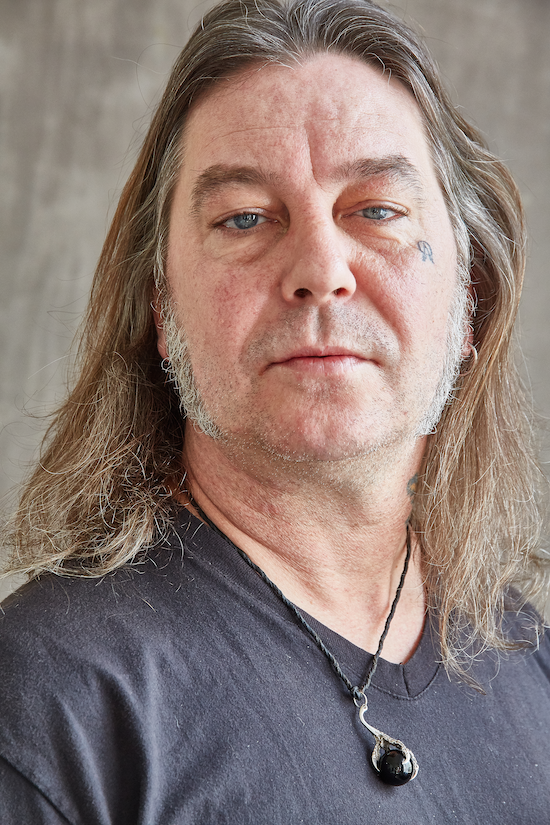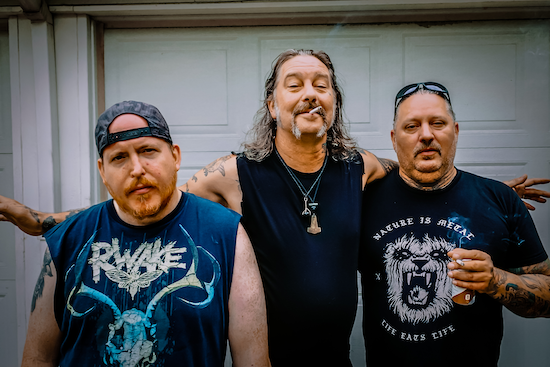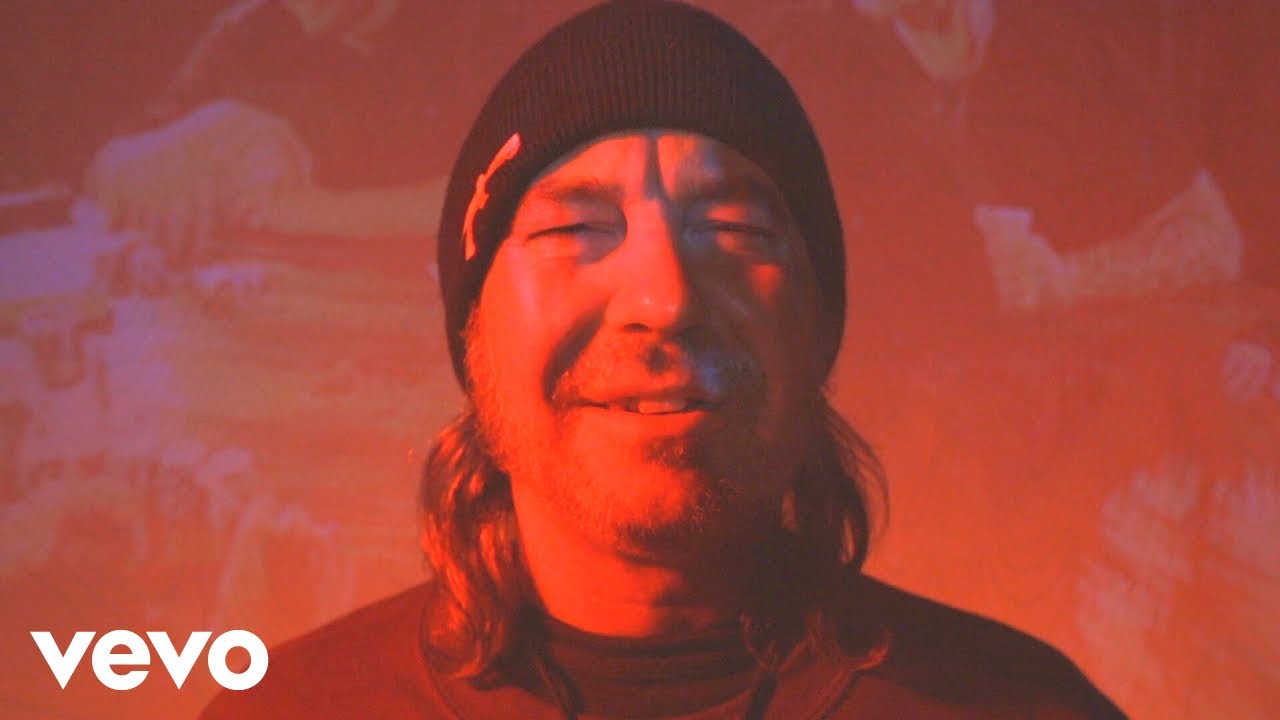Matt Pike by Juan Carlos Caceres
Matt Pike is a son of thunder, and he cannot be contained.
In Sleep, the “stoner jam band” (his words) in which he plays guitar, Pike chases the ultimate tone. Onstage, as his strings ring out, he is restless. He switches between pedals and adjusts the volume of his pickups, searching for the sonic brew that just feels right. Sleep’s sound is nothing short of monumental. Since they reformed in 2009, they have built up their wall of amps and slowed down even further. The notes they land on are milestones in a bigger journey to conjure an ineluctable power through mass, volume and sustain.
In contrast, High On Fire sounds nasty and brutish. Pike founded the band in 1998, after Sleep originally disbanded when their hour-plus epic Dopesmoker was bowdlerised by their record label. But even on High On Fire’s first album, The Art of Self Defense, Pike was spilling over his own boundaries. Riff cycles went on and on. His solos were dense and sprawling. He drawled and rasped, sort of in tune. He became a top-tier frontman.
On The Art of Self Defense, Pike came off writing some of the foundation riffs of the stoner metal genre in Sleep, and then tossed out ‘10,000 Years’ – which most stoner guitar players would retire on – as if it was nothing. High On Fire’s third album, 2005’s Blessed Black Wings (produced by Steve Albini) was red raw and head-spinning. Pike sounded like his vocal chords were in shreds, while the songs were crafted with a staggering, unorthodox complexity.
As the actor and High On Fire/Sleep superfan Rob Delaney told me: “Pike is an amazing composer for any genre, and a truly virtuosic guitar player but his music is always nasty, always dirty. It’s like there’s a war inside Pike between Bach and the Creature from the Black Lagoon.”
In Pike’s lyrics, too, there is a perennial conflict between the barbarian self and civilisation. The former is captured in the battle axe-wielding demon on the cover of 2002’s Surrounded By Thieves and the war drums of ‘Hung, Drawn & Quartered’: “Stand now in battle and we’ll crush the clan and their kind,” Pike bellows.
Pike’s wrangles with civilisation are threaded throughout High On Fire’s discography. He is fixated on the hidden forces at play in our lives – “The sacred secrets of society”, as he calls them on the song ‘Madness Of An Architect’. That song is on the 2012 album De Vermis Mysteriis, named for a fictional grimoire translated as Mysteries Of The Worm, invented by writer Robert Bloch.
On ‘The Black Plot’ from 2015’s Luminiferous Pike writes of “Man’s ancient pact” and “Frequencies changing dark crowns”: barely concealed references to the conspiracy theories of David Icke – of interdimensional reptilian beings from outer space using vibrational energy to run the show.
Pike wrapped the barbarian slave warrior into a landscape of Icke-endorsed Sumerian deities in the near-ten-minute epic ‘Steps Of The Ziggurat/House Of Enlil’ from 2018’s Electric Messiah: “Annunaki queen gives the doom of wombs/I take my place in the ranks of war”. The same album won Pike a Grammy Award for Best Metal Performance for the title track.
Now, Pike is going it alone against the world with his first solo album, Pike vs The Automaton. He’s not on his own really, since the album features a host of guests. He describes it as a “psychedelic rock record”, proving how overused a musical descriptor “psychedelic” has become. It is, though, to use another overstretched adjective, a very “diverse” album – for Matt Pike.
“It was very liberating,” Pike explains to me over Zoom. “I really got to do a lot of things that I can’t really do. I mean, I could do them with High On Fire, but they don’t make sense to me. I mean, yeah, this record has a wide array of stuff on it, you know? It’s heavy and poppy and like Motown, country and western, old school… Just weird stuff on it that I was trying to accommodate myself with. What I mean is, to try to throw any sort of root influences that I had in there.”
When I speak to Pike it’s nine o’clock in the morning in Portland, Oregon, where he lives. He has just spilt water all over his bluetooth speakers and is fiddling with wires so he doesn’t have to listen to me through his laptop speaker: “Apple doesn’t make products for deaf people apparently,” he says with a smirk. The garbage truck rumbles in the background.
This is his first interview of the day and it feels like he still hasn’t shaken off his dreams. There is the flash of steel in Pike’s eye when he gets worked up. It’s easy to imagine being slaughtered on the battlefield by him in ages past – leering over me with his greying shaggy hair and toothy grin.
Pike vs The Automaton begins just like a High On Fire album with the hard-charging ‘Abusive’ – scouring guitars delineate a terrain where “Portal hordes” and “Dimensional travellers” collide on “The killing floor as war bleeds”. But the album departs the earthly realm with the final song, ‘Leaving The Wars of Woe’. It’s a squelchy chuggathon that breaks up into a consciousness-troubling torrent, where the biblical Nephilim are cast as “Wanderers of an astral breed” and “Fleeing cometh in archons” – Icke’s name for the elite reptilian beings.
“They’re leaving this place, Earth, or our galaxy or whatnot, because we fucking fucked it up,” says Pike. “We’re doomed. It’s done. It doesn’t matter. Like, we could get swept off the face of the planet. We’re all worried about climate change. The earth is just going to flick us off like an ant. And It will be fine. It’s been here for a long time. It’s not going anywhere. We are, though.”
Pike has that hardness in his eyes as he tells me this.
“That’s not cos of global warming, dude,” he continues. “That’s cos the poles are shifting. That’s cos of the grand solar minimum. And global warming has something to do with some of it – the weather – but it’s not all of it. And no one tells anybody about the rest of the science behind what’s going on with the weather. And this place gets hit by fucking asteroids that clear things out every now and then. Occasionally, the poles flip. And it’s a known fact, but you know, they want to sell you on, ‘Yeah, but give a billion dollars to some politician guy who knows how to fix it.’ Fix what? The earth will fix itself. You can’t fix it. Who knows how to regrow icebergs? Do you know how to do that? I don’t know anybody who does. So why should I give you any money? That kind of thing. That’s just… I’m just ranting. I’m sorry. Like I said, I just woke up.”

Matt Pike by Jen Rosenstein
The album’s lead single is ‘Alien Slut Mum’ (you kiss your alien mother with that mouth, Matt?). A hectic video was shot out in the woods in BigFoot territory where an inebriated Pike and friends are picked off by an aggressive alien.
“The elites we talked about, they don’t want you in the woods,” he sneers. “They don’t want you to be self-sufficient. They want you in the cities, begging them for your clothes: ‘You will own nothing and like it. Fuck you!’”
In the video’s credits special thanks are given to Sam Raimi (presumably for the Evil Dead homage) as well as (amongst others) David Icke and Jeff Bezos – the latter one of the billionaire class intent on leaving the earth rather than saving it.
Pike also seems far from committed to saving it. ‘Alien Slut Mum’ ends with a sample from a 1963 episode of The Twilight Zone called ‘No Time Like The Past’: “We live in a cesspool, a septic tank, a gigantic sewage complex in which runs the dregs, the filth, the misery-laden slop of the race of men: his hatred, prejudices, passions, and violence. And the keeper of this sewer: man.”
‘Alien Slut Mum’ has a line that jumps out: “Inversion of the truth is the way that they always win”. I ask Pike how he feels about the notion of objective truth after it has been shaken down so vigorously in the last few years, to the point that all “truth” seems subjective.
“It’s not even subjective. It’s just not true,” he responds. “Everything’s so quantum – anything that’s threatening. You know what – you know what’s true? It’s when they call it ‘misinformation’, then you know it’s true, because that’s what they’re scared of anybody knowing. Or ‘debunked’: ‘That’s been debunked.’ Anything that’s like that: you’re being lied to. Completely. I mean, it’s fucking obvious. But we don’t see that and we keep watching, keep doing, get the ratings up there, yeah!”
I can’t scoff at Pike for saying this. We live in an age of mistrust. Pike’s particular brand of paranoia can be traced all the way back to August 1929 when Weird Tales magazine published The Shadow Kingdom by Robert E. Howard.
In the story, the palace of Kull (the barbarian King of Valusia) is overrun by snake men who take on the form of his courtiers and guards: “‘That is, they can, by a magic charm or the like, fling a web of sorcery about their faces, as an actor dons a mask, so they they resemble anyone they wish to,’” he is told.
In a “lionlike bound”, Kull leaps to bring his sword down on one of the serpent men that has taken Kull’s own form and is addressing his court. It has been explained to Kull that other monarchs in the kingdom of Valusia had been usurped in this way. Their subjects remained oblivious to being ruled over by a serpent cult. There is no comfort in this knowledge. Kull is assailed by visions of “strange nightmare forms, fantasies of lunacy and fear” through which he must follow “the long bloody trail of his destiny”. For Kull, it is a lonely world of life-changing revelations.

Matt Pike by Jen Rosenstein
“Not a tonne of people see eye to eye with me,” admits Pike. “I’m the closest thing to, politically speaking, I guess, an anarchist libertarian. I just don’t want to be fucked with and I hate fucking people who tell me what I can and can’t do. I want to live free and I don’t want to fucking answer to government, or some cop, or some fucking dickhead who thinks they have better fucking morals than me. Go work a day, you know? I put hard work into what I do. I try to speak the truth about how I understand the world. There’s a lot of fucking nonsense going on. Nonsense… makes it really hard for the rest of us to make real art.”
Pike’s hometown of Portland has had its fair share of nonsense recently. Portland is a famously liberal city, so when the far-right Proud Boys decided to hold a ‘Summer Of Love’ rally in an abandoned KMart car park in August last year, it swiftly turned into a running battle with anti-fascists. One Proud Boy touted a paintball gun out of the window of his flatbread truck which was carrying a replica of the Statue of Liberty. The incident followed a year of protests and rallies in the city.
In the build-up to the album’s release, Pike has spoken fondly of his grandfather (“hard as fuckin’ woodpecker lips”) and his uncle. They inspired him to pick up a guitar. Pike was a troubled kid, with stints in juvenile detention and military school. He was taught the lessons of life the hard way. If his BMX bike broke – he fixed it. He prides himself on his work ethic. He doesn’t have much time for “feelings”.
“Start wearing a helmet or go out in the fucking jungle, dude,” he says, with eyes like Kull’s – full of the grey ice of the cold sea. “Go out in the forest and see how the cougar feels about you walking around with its cubs. And tell me what’s fair. After it fucking mauls your neck off and bites your face off. Or perhaps you could win that – fucking some Jujitsu dude, like, killed the fucking cougar by fucking strangling it to death? Well, is that fair to the cougar? You know? Yeah, it didn’t expect that. It expected a victim. So, you know, fairness – that’s a limited thing. The universe doesn’t pass that out all the time. It’s fucking hardship for everybody, dude. It’s fine. It’s not a walk in the park. It doesn’t matter what or who you are, what sex you are, you know – things aren’t handed to everybody.”
Pike didn’t like being locked down at home. He felt something major was coming down the line as the stirrings of the pandemic were being reported in early 2020. Sleep had already decided to “take a nap” that year, so he applied for a loan and got ready to be bunkered down: “No one’s going to be able to work. I could see it coming a mile away.”
“I self-destruct man if I ain’t got nothing to do,” he says. He rang drummer Jon Reid and asked him to come and jam in his garage: “‘I’m gonna start shooting,’” he told Reid. “‘I’m gonna go postal on everybody if I don’t get to play some riffs soon.’”
The album’s most berserk track, and a good reminder of the madness of 2020, is ‘Acid Test Zone’. Like a jammed transmission, it is head-charging, near-grindcore thrash intercut with snatches of music and television excerpts. It features Pike’s wife, Alyssa Maucere-Pike on vocals and bass. Reid is the drummer in her own band. Reid already had his drums set up in the couple’s garage. He was also looking after their dog, Crom, named after the gloomy god of Robert E. Howard’s Conan the Barbarian stories.
Maucere-Pike walked into the garage in a foul mood one day while Pike and Reid where jamming, plugged one of the guitar mics into another board and started screaming murder into it. ‘Acid Test Zone’ was born. When they recorded her properly for the song, she got drunk on White Claw, an alcoholic seltzer beverage. Then “Barb”, her bolshy East Coast alter-ego, took over. It’s typical of the loose, spontaneous family-and-friends feel of the album.
‘Land’ came out of a little jam session with his wife after Pike got back from tour. They sat around with cheap acoustic guitars and worked out the initial arrangement for what is the farthest-reaching musical excursion on the album. Pike recorded his vocals into headphones using a four-track phone app, adding some reverb to give it the feel of a soul singer down in the subway. Almost unconsciously, he worked it into a country music-inspired two-step. The lyrics are redolent of the Great Depression his grandfather lived through.
Pike invited Mastodon’s Brent Hinds to lay down a guitar solo on it. Hinds and Pike had started working on their own side project before COVID hit, something “heavy, trippy and bluesy”, according to Hinds. Famously, Mastodon formed at a High On Fire show in Atlanta in 2000. Hinds and Pike are both instinctive guitar players, relying on feel and bloody-mindedness. But I’ve seen Hinds play poor shows with Mastodon, whereas Pike – in the dozen or so times I’ve seen him live with Sleep and High On Fire – always excels.
At the ATP in Minehead, Somerset, in May 2009 where Sleep reformed after over ten years, I spotted Pike in one of the resort bars in the early evening of the Saturday looking “well oiled”. He was swaying at the bar talking to a friend. Sleep weren’t due onstage until 1am, so I was a bit concerned. But he later commanded one of the defining shows of his career. What did I know about what makes Matt Pike tick?
‘Land’ is also a tribute to the barn dances Pike’s mother attended when she would “dance with all these fucking cowboys”, he laughs. She moved her young family from Michigan to Denver, Colorado, and then to Golden, Colorado, where they brew Coors beer. She was into mountain men and survivalists and Pike puts his own “redneck-y” characteristics down to this period, before he got into trouble and was sent to military school.
One of Pike’s best songs, ‘The Sunless Years’ (from Luminiferous), isn’t about the secret ways of the world, but dropping acid as a kid: “I suppose it was about drug use and being judged growing up.”
When he moved again, this time to San Jose, California, he met Al Cisneros, Chris Hakius and Tom Choi – who played together in a band called Asbestosdeath. Pike invited himself along to one of their rehearsals – “don’t bring your amp, just watch,” they told him. But Pike doesn’t like being told what to do. He brought his guitar along and forced his way into the band. Over time, Asbestosdeath morphed into Sleep, shedding members to become the power trio of Cisneros on bass, Hakius on drums and Pike on guitar. Hakius left again after the two ATP reunion shows. Sleep has carried on with Neurosis drummer Jason Roeder.
Sleep’s musical father is Black Sabbath’s Tony Iommi. Pike’s real father looked uncannily like Iommi in the mid-seventies, but it was his uncle who first introduced him to Sabbath. I ask Pike about the immense coda riff to ‘Apollyon’ on Pike vs The Automaton, which is one of the true Sleep-like moments on the album. He explains that it’s his own version of the bridge riff from Sabbath’s ‘Children of the Grave’, which he describes as the “perfect riff”. The coda to ‘Apollyon’ shares its tonality but Pike has adapted and altered its structure, so that his riff cycles in that strangely prolonged and hypnotic way which is truly Pike-ian.

Matt Pike and band, by Juan Carlos Carceres
Is the “Iommic Life”, which Cisneros sings about on Sleep song ‘The Clarity’, ever complete?
“I think it’s quantum,” Pike responds, using that term again. “There’s a tree. It’s like the tree of life. I think it’s the root of a certain style of playing – that I picked up on as a kid. Something you obsess with and can go in one hundred different directions.”
I wondered if embarking on a solo project gave Pike the freedom to open himself up to his background more than ever. In his eyes, reflecting on his past has been prompted by the present moment: “I was more thinking about how the world was, and how it’s never going to be the same again.”
Then he starts on a rant about how the pandemic is “a transfer of wealth”, and the reporting about it “a spectacle of opinion that shouldn’t be in journalism to begin with”. Well, it’s undeniable that the rich have gotten richer during the pandemic. Oxfam has said that the wealth of the world’s richest ten men has doubled over its course. Where the line is crossed into the realm of conspiracy theory is the notion that the pandemic was initiated in order to achieve this enrichment, rather than it being epiphenomenal.
Pike urges me to read the lyrics to High On Fire song ‘Luminiferous’, released in 2015, which he says is “exactly about what’s happening now”, and how it’s “fucking so weird”. I looked back at the lyrics of the song and this is how it ends: “Evolution virus, once inside us/ Injection chip so new/ If we relied on reptoid kindness/ I think we’re all just screwed”.
As we wrap up our conversation Pike comments, “I probably spoke more truth than I should have – but whatever.”
There is no mystery to Matt Pike – he is open, honest, engaged and engaging. What he believes comes from a sincere distrust and hatred for the automaton he sees straddling the world. Having his primary source of income ripped away for the best part of two years hasn’t helped either. The troubling thing (to the bog-standard "centrist" and/or "liberal" mindset) is that even his most out-there views have gained currency in the ten years since he released De Vermis Mysteriis. David Icke’s theories seem more popular than ever.
But am I troubled by enjoying Matt Pike’s art, which expresses these ideas in some of the most vitalising heavy guitar music of the generation that grew up listening to Black Sabbath? No, I’m not. Personally, I’ll take the thunder with me and leave the reptilians at the door. Because I find his music so enjoyable and useful to my sense of wellbeing, I don’t feel in a position to judge him.
“I don’t see things going in a very good direction,” he says after one final diatribe about soft parenting. “Pardon me if I’m dark.”
The truth is, I feel neither in a position to pardon Matt Pike, nor to condemn him.
Pike vs The Automaton is released by MNRK Heavy on 18 February. Head on a Pike: The Illustrated Lyrics of Matt Pike, published by Rare Bird Books, is available now.



